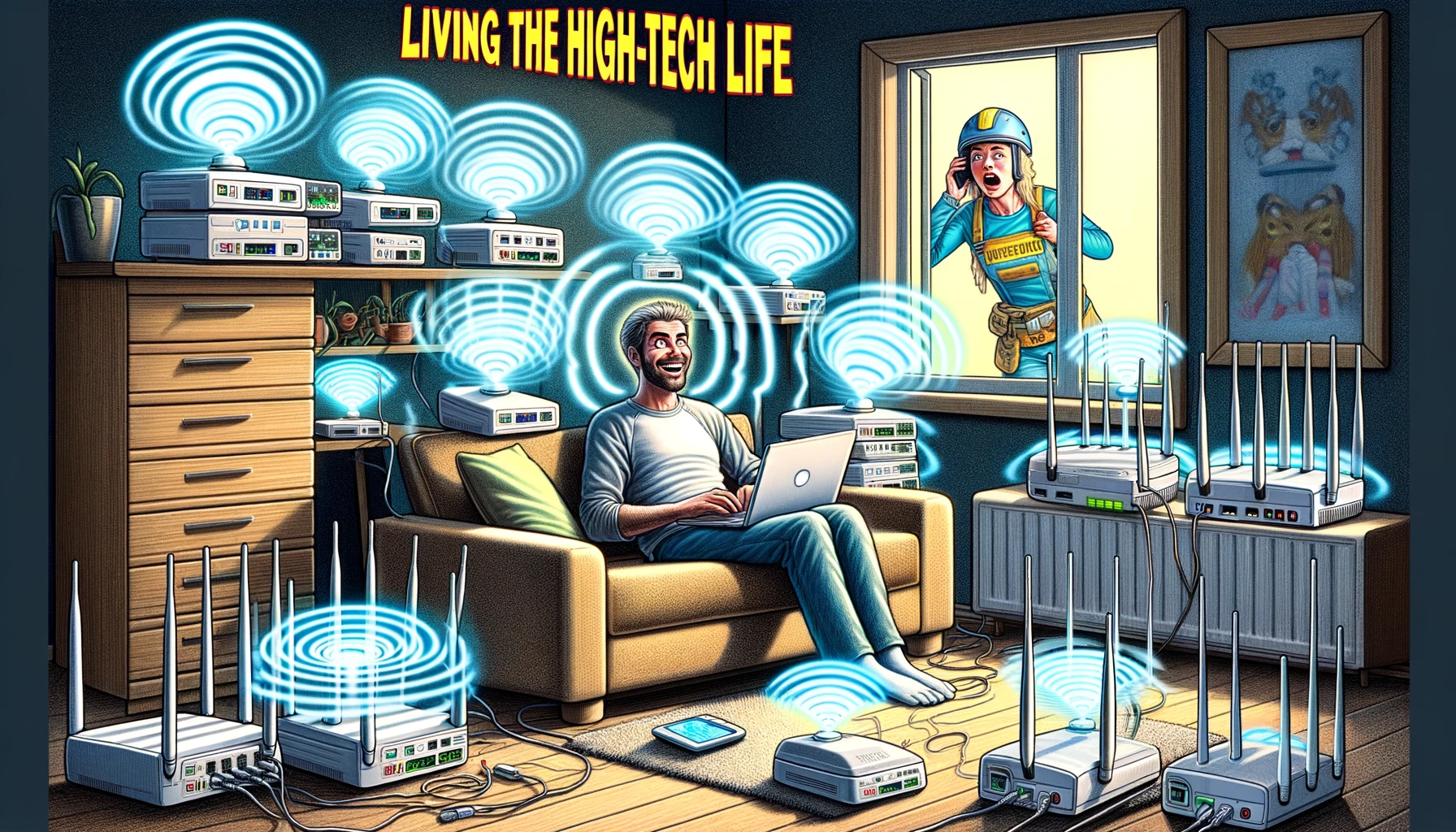The document titled “Evaluation of Health Hazards Due to The Wi-Fi Router On Humans” by Karar H. Hussein and colleagues, published in the Journal of Physics: Conference Series, 2021. This comprehensive research aims to investigate the potential negative health effects of Wi-Fi routers on humans, given their omnipresence in homes and workplaces for communication and internet access. The study underscores the pervasive use of Wi-Fi routers and the consequential exposure to radiation, which may cause various health issues such as heart diseases, sleep disorders, brain tumors, hearing problems, and male infertility, among others.
To ascertain the health impacts of Wi-Fi router radiation, the researchers distributed questionnaires to medical doctors across five major hospitals in Najaf, Iraq, and to individuals residing in areas with varying levels of Wi-Fi router exposure. The study’s findings suggest that Wi-Fi routers have a discernible impact on human health, although this effect does not surpass a 30% threshold of the total health risk. Particularly, individuals with Wi-Fi routers in their homes reported more symptoms compared to those without. Notably, females appeared to be more susceptible to the effects of Wi-Fi router radiation than males.
The methodology employed included both theoretical approaches and surveys, with questions designed to elicit information on the potential health impacts of Wi-Fi routers. The study’s results, based on responses from 296 medical professionals and a diverse sample of the population, indicated a general consensus (98% of medical professionals) that wireless devices, including Wi-Fi routers, directly impact human health. However, the exact percentage of health impact attributed to Wi-Fi routers varied, with a significant proportion of medical professionals estimating this impact to range between 20% and 30%.
Moreover, the research revealed that exposure to Wi-Fi routers is associated with an array of symptoms, including but not limited to brain tumors, concentration difficulties, dizziness, hearing problems, heart diseases, and infertility in males. The presence of these symptoms was more pronounced in individuals living in areas with Wi-Fi routers compared to those in rural or router-free environments. Importantly, the study also highlighted that children and females might be more vulnerable to the health risks posed by Wi-Fi router radiation, suggesting a need for further investigation into the gender and age-related differences in susceptibility to electromagnetic radiation.
The study by Hussein et al. presents significant evidence of the health hazards associated with Wi-Fi router usage, advocating for a cautious approach to the deployment and utilization of these devices in residential and occupational settings. The findings contribute to the ongoing discourse on the safety of electromagnetic radiation from wireless devices, underscoring the importance of continued research and regulatory oversight to mitigate potential health risks.
Here are several studies that have explored the potential health impacts of exposure to electromagnetic fields (EMFs), including those emitted by Wi-Fi routers:
- International Agency for Research on Cancer (IARC) and WHO Classification of Radiofrequency Electromagnetic Fields: In 2011, the IARC, part of the World Health Organization (WHO), classified radiofrequency electromagnetic fields as possibly carcinogenic to humans (Group 2B), based on an increased risk for glioma, a malignant type of brain cancer, associated with wireless phone use.
- BioInitiative Report (2012 Update): This report, authored by a group of international researchers, reviews over 1800 new studies and concludes there is significant evidence that EMFs from cell phones, Wi-Fi, and other wireless devices pose a health risk to humans, including effects on gene and protein expression, oxidative stress, neurotoxicity, and an increased risk of cancers.
- “Effects of mobile phone use on brain tissue from the rat and a possible protective role of vitamin C – a preliminary study” by Dasdag et al. (2014): This study found that long-term exposure to mobile phone radiation could cause damage to brain tissues, which was somewhat mitigated by the antioxidant properties of vitamin C. This suggests that the biological effects of wireless radiation might be complex and involve oxidative stress pathways.
- “Wi-Fi is an important threat to human health” by Martin L. Pall (2018), Environmental Research: Pall reviews several studies on Wi-Fi and other EMFs, discussing their potential impacts on human health through mechanisms such as oxidative stress, sperm/testicular damage, neuropsychiatric effects, cellular DNA damage, and endocrine changes.
- “Oxidative mechanisms of biological activity of low-intensity radiofrequency radiation” by Yakymenko et al. (2016), Electromagnetic Biology and Medicine: This review highlights the potential oxidative effects of low-intensity radiofrequency radiation on living cells, which could contribute to cancer and other conditions.
- “Electromagnetic fields act via activation of voltage-gated calcium channels to produce beneficial or adverse effects” by Martin L. Pall (2013), Journal of Cellular and Molecular Medicine: Pall proposes that EMFs, including those from Wi-Fi, exert their biological effects through the activation of voltage-gated calcium channels, leading to various health outcomes.
These studies, along with the findings of Hussein et al., contribute to a growing body of evidence suggesting that exposure to EMFs from Wi-Fi routers and other wireless devices may have adverse health effects. However, it’s important to note that research in this area is ongoing, and consensus on the degree of risk and mechanisms of action is still being developed. Further, large-scale epidemiological studies and experimental research are needed to fully understand the implications of long-term exposure to low-level EMFs.








